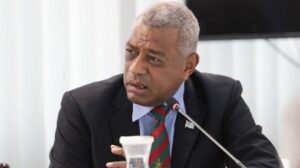
Fiji Rugby Director Blamed ‘Gay Problem’ for Olympics Performance – Outsports
The national rugby director blamed the “gay problem” for the team’s poor performance in the Paris Olympics, which led to her dismissal.
Laijipa Naulivou was fired by the Fiji Rugby Union after claiming it was justified to dismiss a sevens coach who “practices lesbianism.”
Fiji women’s team players celebrate their qualification for the Paris Olympics after winning the Oceania Rugby Sevens Championship in Brisbane’s Ballymore Stadium in November 2023. | Hyserb / Shutterstock
Laijipa Naulivou, recently appointed director of the Fiji Rugby Union, was terminated after only four days on the job, following controversy over her comments regarding “lesbianism” in the women’s team and its impact on their performance in the Paris Olympics.
Naulivou, the first captain of the Fiji women’s national team, is a significant figure in the rugby culture of Fiji, a rugby-mad Pacific nation.
She was appointed to her new role on Saturday but quickly faced backlash after suggesting in a newspaper interview that there was a “gay problem” within the women’s rugby team.
Naulivou argued that this issue was partly to blame for the team’s disappointing performance at the 2024 Paris Summer Olympics and stated that if the situation was negatively affecting results, it should be “addressed.”
Following widespread criticism, the Fiji Rugby Union announced on Wednesday that Naulivou’s contract had been terminated.
Several women’s rights organizations in the country, which has a population nearing 1 million, denounced Naulivou’s remarks.
Nalini Singh, executive director of the Fiji Women’s Rights Movement, called Naulivou’s comments “deeply troubling” and stated that the rugby union should focus on funding and player well-being, not on players’ sexuality.
The Fiji Women’s Crisis Centre also condemned Naulivou’s statements, while DIVA for Equality Fiji called for better protection of LGBTQ sportswomen in the country.
Last summer, Fiji placed last in the women’s rugby sevens competition at the Paris Olympics, losing all five of their matches.
New Zealand retained the title, with Canada taking second and the USA earning a podium spot. At least nine openly LGBTQ athletes competed in these teams, and the “Team LGBTQ” roster for the tournament included 16 players.
Fiji’s team had earned a bronze medal at the Tokyo Games three years prior.
Naulivou told the Fiji Sun that she had been asked to take over as team manager in November, just three weeks before the 2024-25 SVNS season opener in Dubai. She later submitted a report to the rugby union, reflecting on the tournament and the disappointing performance in Paris.
“I wrote my report and recommended removing the coach and those involved,” she said.
“We should hold a fresh, fair trial and panel to select the team.”
Naulivou added, “This would be better than having someone who practices lesbianism selecting the team. To me, that’s unethical and wrong.”
New Zealand’s Manaia Nuku (4) carries the ball against Fiji during the Paris 2024 Olympic Summer Games at Stade de France. New Zealand won the match 38-7. | Kirby Lee-USA TODAY Sports
According to RNZ, tensions within the Fiji team were blamed on personal relationships among teammates, which contributed to their underperformance at the Olympics.
Naulivou insisted to the Fiji Sun that she would “always speak against” homosexuality in women’s rugby, stating, “I know I’m very unpopular with those who practice it.”
She claimed that women’s rugby faces a wider “gay problem,” pointing out that a former rugby union CEO once provided her with a report detailing this issue in European rugby.
“Retention of players is a big issue, as when they marry, their husbands don’t want them to play, or they get pregnant and don’t return,” Naulivou said.
“Retention and this gay problem were the main challenges identified in European rugby, and Fiji faces similar issues.”
Until 2010, intimate same-gender relationships were illegal in Fiji. There is still no legal recognition of same-sex marriage in the country, and public support for LGBTQ rights remains limited.
When asked how the “gay problem” should be handled among the players, Naulivou responded: “It’s their right, but if it’s affecting the team, it should be addressed.”
Naulivou captained the first “Fijiana” sevens team in 1997 at the Hong Kong Sevens. She later became an academic and sports psychologist and has held administrative roles in field hockey.
After her interview was published, Naulivou faced significant backlash. The Fiji Rugby Union quickly distanced itself from her comments, stating that “they were her personal views and not the official stance of the FRU.”
FRU chairman John Sanday later confirmed that Naulivou’s tenure had ended.
“Although she offered her resignation, the Board decided that a strong stance was necessary to uphold professional standards and maintain the integrity of Fiji Rugby,” Sanday said.
“FRU categorically rejects any form of discrimination.”
Naulivou’s remarks were criticized by the Fiji Women’s Rights Movement, with Singh stating, “The idea that being gay is a ‘problem’ in women’s rugby is deeply troubling and reinforces harmful stereotypes that have no place in modern sports or society.”
Fiji’s women’s team finished 10th out of 12 teams at the South Africa SVNS tournament in December and ninth at the Australia SVNS in Perth recently. The next event in the series is in Canada later this month.
Fiji’s 15-a-side team has qualified for the Women’s World Cup in England this August, having narrowly missed out on the quarterfinals during their tournament debut four years ago.






